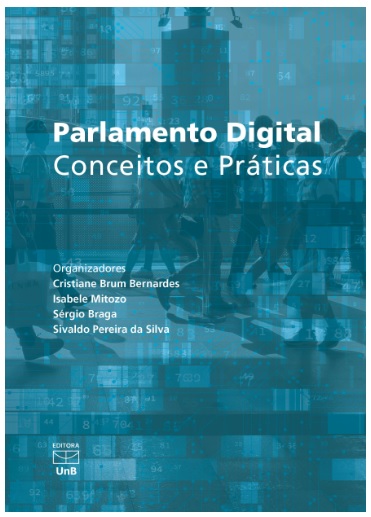Parlamento digital: conceitos e práticas (Digital Parliaments: Theory and Practice) is a new e-book published by Editora Universidade de Brasília (EDU) which features chapters written by members of the International Parliament Engagement Network (IPEN).
Organized by leading researchers in the field of legislative studies in Brazil — including IPEN members Cristiane Brum Bernardes (Chamber of Deputies, Brazil) and Isabele Mitozo (Federal University of Minas Gerais) — the volume brings a set of texts that covers the digitization of parliaments from different perspectives.
Any analysis of the institutional and political scenario of the 21st century needs to take into account that the use of the internet by political actors is a growing reality in most countries. With regard to Parliament, the central institution of representative democracies as we know them, the perspectives and trends follow the same direction.
Representatives, institutional actors, citizens and civil society organizations are engaged in the use of different platforms, with a specific interest in influencing political decisions, in a process that studies call ‘Digital Democracy’.
In the last two decades, the acceleration of the processes of digitization of the political sphere around the world, especially with the entry of political actors and institutions into the social media environment, has created new complexities for the relationship between legislative houses and citizens.
This is one of the focuses of the publication, which thematizes different aspects of the digitization processes in the representative institutional environment.

Cristiane Brum Bernardes and Isabele Mitozo have written and contributed to chapters on ‘The crowdlaw experience in Brazil: Online collaborative drafting of laws in the Chamber of Deputies’ and ‘Digital Innovations for Parliaments: Research and Practice’.
Isabele Mitozo is Assistant Professor at the Federal University of Minas Gerais. She takes the promotion of democratic values, as transparency and public engagement, in Parliaments as the focus of her research. Isabele said:
“In a context of high discredit in political institutions, it is important that parliaments, one of the institutions with the least credibility among citizens, understand how to use digital tools to reinforce democratic values and try to reconnect with the public, which is extensively discussed in the book.
“In the first chapter, we present a brief history of the digitization of parliaments, how this panorama has added new concepts to the literature and established a new area of studies on digital innovations for parliaments. This highlight is important for the understanding of the purposes and characteristics that should be implied to the initiatives developed into the Houses.”
Cristiane Brum Bernardes works at the National Observatory of Women in Politics (ONMP) and as a professor at the Master in Legislatures at the Centre for Education and Training (CEFOR), both functions of the Brazilian Chamber of Deputies. Her research and professional practice focus on political identities and communicative performances, specifically of women politicians through social media and institutional spaces. Regarding the experiences of crowdlaw, Cristiane said:
“The potentials of crowdlaw systems are already widely known, but it is also necessary to discuss their limitations, such as the design and format of online platforms, the management of participation in these tools, and the uneven and incomplete implementation of these intentions.”
The book also includes a chapter on ‘E-Petitions to Parliament’ by Cristina Leston-Bandeira, Professor of Politics at the University of Leeds and Chair of IPEN. Cristina’s research is themed around the relationship between parliament and citizens, particularly public and digital engagement, and in recent years much of her work has been focused on petitions. Cristina said:
“E-petitions have become very popular in the 21st century, following a general decline in paper petitions in the 20th century. The electronic format of petitions enables an amplification of its potential in reach and, when parliaments have well integrated processes, they can lead to effective pathways for citizens to shape policy.”
It is important that parliaments, one of the institutions with the least credibility among citizens, understand how to use digital tools to reinforce democratic values and try to reconnect with the public.
Isabele Mitozo
The book concludes with ‘An Agenda for Research, Reflection and Practical Applications in Digital Parliament’ from all four editors which presents an overview on the current state of digitization in parliaments, the problems and advances in the initiatives presented in the chapters, and the new possibilities showed by the Covid-19 pandemic adaptations in Parliaments.
Ultimately, all these initiatives have become opportunities to reinforce democratic values and improve digital governance in Parliaments and Legislatures, even if most of them still need a real connection with the legislative process.
Parlamento digital: conceitos e práticas (edited by Cristiane Brum Bernardes, Isabele Mitozo, Sérgio Braga and Sivaldo Pereira da Silva) was published by Editora Universidade de Brasília (EDU) on 3 October 2023.
The e-book can be found here via open access. Please note that the book is only available in Portuguese.
More information
Cristiane Brum Bernardes is a Professor and researcher of the Master’s in Legislatures at the Centre for Education and Training (CEFOR) of the Brazilian Chamber of Deputies. With a PhD in Political Science, she works at the National Observatory of Women in Politics (ONMP) from the Chamber. She is also a member of the National Institute of Science and Technology in Digital Democracy (INCT-DD), the Global Research Network on Parliaments and People (SOAS, University of London) and the International Parliament Engagement Network (IPEN).
Isabele B. Mitozo is an Assistant Professor in the Political Science Department/Faculty of Philosophy and Human Sciences of the Federal University of Minas Gerais (Brazil), and coordinates the Research Group on Democracy, Communication and Digital Engagement. Her research agenda focuses on digital innovations for promoting transparency and public engagement in parliaments and legislatures.
Cristina Leston-Bandeira is Chair of IPEN and a Professor of Politics in the School of Politics and International Studies at the University of Leeds. She has conducted research on Parliaments for nearly 30 years. Her research focuses on the relationship between Parliament and citizens, particularly public and digital engagement. Hear Cristina talk about e-petitions in a recent UK House of Commons Committee Corridor podcast.
Article published: 24 October 2023

